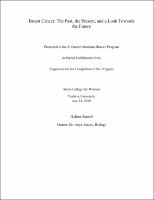Please use this identifier to cite or link to this item:
https://hdl.handle.net/20.500.12202/4480| Title: | Breast Cancer: The Past, the Present, and a Look Towards the Future. |
| Other Titles: | Presented to the S. Daniel Abraham Honors Program in Partial Fulfillment of the Requirements for Completion of the Program. |
| Authors: | Alayev, Anya Israel, Adina |
| Keywords: | breast cancer senior honors thesis Tamoxifen therapies estrogen-receptor positive breast cancer breast cancer treatment immunotherapy treatment HER2 Positive breast cancer HER2 Negative Breast Cancer Trastuzumab Lumpectomy Mastectomy Prophylactic Surgery Radiation therapy Chemotherapy Combination therapy Progesterone epigenetics hereditary factors genetic influences clinical diagnosis |
| Issue Date: | 14-Jun-2019 |
| Publisher: | Stern College for Women. Yeshiva University. |
| Citation: | Israel, Adina. Breast Cancer: The Past, the Present, and a Look Towards the Future Presented to the S. Daniel Abraham Honors Program in Partial Fulfillment of the Requirements for Completion of the Program Stern College for Women Yeshiva University June 14, 2019. |
| Abstract: | Breast cancer is a multifactorial and complicated disease with many risk factors, subcategories, and therapy options. The current methods of therapy cause great harm to the woman they are attempting to heal and their success in healing is inconsistent. Researchers disagree on which treatment options are most successful for each subclass of breast cancer. Tamoxifen, for example, is regarded by some as a highly successful therapy for estrogen-receptor positive breast cancers. Other researchers however, think Tamoxifen does more harm than it does good and should not be used. This is one of several similar controversies discussed in this thesis (other include whether estrogen should be upregulated or down-regulated, whether self and clinical breast screening are beneficial or dangerous etc.). The thesis will address the many opinions surrounding important decisions in breast cancer treatment and suggest that a more systemized method (genomic screening) should be used to determine when each treatment option will be successful and when it will be resisted. It will also suggest future success trends in breast cancer treatment, mainly the development of the immunotherapy treatment method which will reduce resistance and harsh side effects and promote successful healing in even the most challenging cases. |
| Description: | The file is restricted for YU community access only. |
| URI: | https://hdl.handle.net/20.500.12202/4480 https://ezproxy.yu.edu/login?url=https://repository.yu.edu/handle/20.500.12202/4480 |
| Appears in Collections: | S. Daniel Abraham Honors Student Theses |
Files in This Item:
| File | Description | Size | Format | |
|---|---|---|---|---|
| Adina Israel Final Senior Honors Thesis.pdf Restricted Access | submitted by HR/SCW | 2.05 MB | Adobe PDF |  View/Open |
This item is licensed under a Creative Commons License

